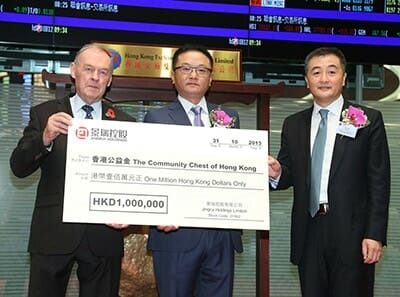
Maybe Jingrui will have a bit more cash to give away after its $150M bond sale
China’s Kaisa Group became the country’s first real estate developer to default on its offshore debt obligations on Monday last week, and by Friday international bond investors were snatching up new notes issued by two junk-rated mainland property firms.
Hong Kong-listed Chinese developers Jingrui Holdings and Landsea Green Properties priced a total of $250 million in US dollar denominated debt at the end of the week, despite Kaisa defaulting on Monday and a Chinese state-owned solar equipment manufacturer failing to repay investors on Tuesday.
The successful bond sales are being seen by analysts of ongoing confidence in the country’s property sector as the government has moved in recent months to shore up an industry that accounts for at least 15 percent of China’s GDP.
Jingrui Prices $150 Million Bond
Shanghai-based Jingrui Holdings announced to the Hong Kong stock exchange on Friday that it had successfully raised $150 million from the sale of three-year senior notes, becoming the first Chinese real estate developer to price a bond since Kaisa defaulted on two of its bonds in the same week.
Landsea Green Properties, which hails from Nanjing, posted its own notice to the exchange later that same day that it had priced $100 million in three years notes in its own offering.
Jingrui’s bonds offered a yield of 13.250 percent per annum, just slightly higher than the developer had provided in August last year when it offered five year senior notes. The Jingrui bonds received a rating of B3/B, according to a story by FinanceAsia, making the developer the first junk-rated Chinese property firm to sell a new bond since the beginning of March.
Landsea Green Properties, which is the overseas-listed arm of Nanjing’s Landsea Group, priced its offering at an annual yield of 9.5 percent. The company said last year that it expects to invest $1 billion in developing real estate projects in the US in the next several years, focusing on California and the east coast.
Investors Encouraged by New Lending
The two successful bond sales came just days after Kaisa Group Holdings became the first Chinese real estate developer to default on its obligations to offshore bond holders, as the cash-strapped company appears to be prioritising payables owed to local governments and onshore investors.
Kaisa’s failure was followed by Baoding Tianwei Group becoming the first Chinese state-owned enterprise to fail to make a bond obligation when the solar energy equipment maker defaulted on RMB 85.5 million ($13.8 million) of bond interest.
Many analysts see Kaisa’s crisis, which was apparently triggered by a dispute with the local government, as not representative of the market as a whole.
Investors are also reassured by recent government moves to increase the credit supply to property developers.
In addition to cutting interest rates and lowering bank reserve requirements across the board, real estate firms seem to be particular beneficiaries of recent government moves to boost lending, with bank loans to property developers jumping 24.1 percent to RMB 6.08 trillion ($981.8 billion) during the first quarter, according to data from the central bank cited by Reuters.
Leave a Reply